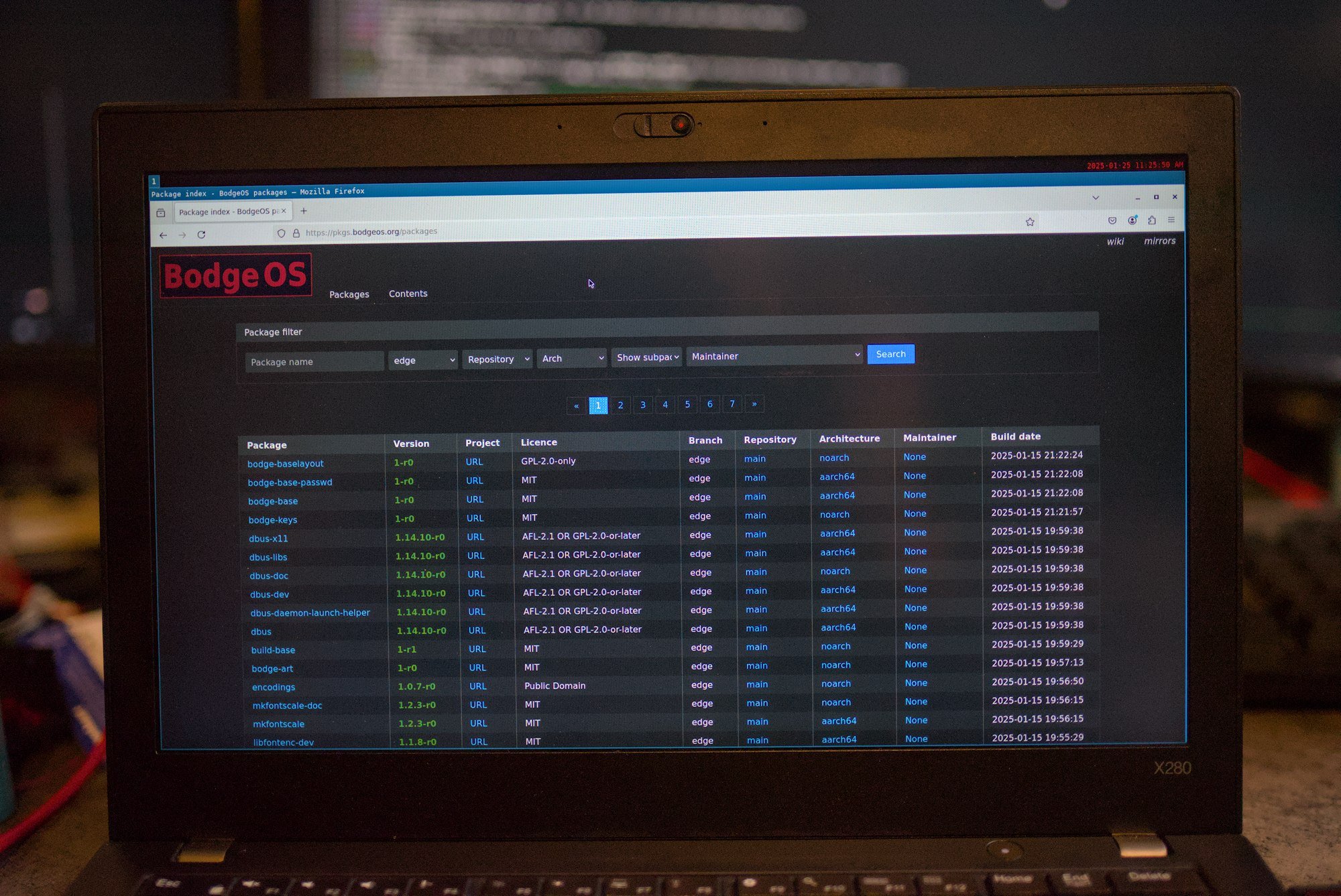After the previous post about bringing up Sway I spend a bit of time packaging random system components you'd expect for a desktop system. Mainly building GTK so I can have some actual applications running. This is mainly pretty relaxing work. Find a component to build, figure out the dependencies, package them one by one by figuring out the required commands and making a tiny build script.
Occasionally the zen of packaging gets disturbed by having to figure out why some build system does something weird, like really wanting to put files in /usr/lib64 instead of /usr/lib while in the previous build it did not do this.
It turns out this is because some build systems perform auto detection of the host system to decide things like "what folder is a good place for the libraries". In this case it was cmake that has autoconfig behavior for this if you don't explicitly define that libs go in the lib folder. At some point installing a broken rebuild of glibc on the host system had changed lib64 back from a symlink to a regular folder again and all builds after that were broken.
The path to Firefox is paved with many dependencies
For my goal of running Firefox I have to deal with several dependencies:
- GTK 3 and the components to make that work like Pango and Cairo.
- A whole assortment of audio, video and image codecs, these can probably be skipped by manipulating the Firefox buildsystem, but it is probably easier to package all of these instead.
- Nodejs is also a dependency for building Firefox since the javascript engine in Firefox itself can't be used to run the javascript components in the build system.
- WASI for having WebAssembly support.
- Rust for large chunks of the Firefox codebase.
- Extra libraries like the Netscape Portable Runtime (nspr) and the libraries for other system features like Alsa and Pulse.
Luckily parts of this have already been packaged as part of getting my Sway desktop working. Many dependencies for GTK 3, WASI and Rust are already packaged for either Mesa or Swaybar, but I had to finally figure out how to bring up Rust in my distro.
This is quite hard in theory because rustc is written in Rust so I need older versions of Rust to build the current version of Rust, and older versions for that again and again until you reach the point where rustc is written in C again. Instead of doing all that I opted to go for the easy road. I curl | sh'ed a functional Rust compiler into my host system with the instructions for rustup.rs and then used that compiler to build my packaged Rust. This was all surprisingly smooth and easy.
Getting NodeJS functional was a bit more painful. This is mainly because it takes forever to build which means it takes forever to fix things while packaging. The same issue with the Firefox build itself actually. The worst thing I've encountered while packaging things is things that take a lot of time to build and don't have the configure script check all the dependencies it needs. I might have been annoyed with autoconf wasting a lot of time at the start of every build of every small package with checks that seem to be completely useless, but the time wasted there does not compare at all to the time wasted in building Firefox and having it crash an hour into the build complaining it's missing a dependency.
Desktop audio
One of the dependencies for Firefox is also the various audio libraries, which in turn means I have to bring up audio on my distro. I spend a moment to figure out wether it would be a PulseAudio or PipeWire system but ended up just picking PipeWire. Most of the issues I've seen with PipeWire seem to stem from bodged migrations from Pulse systems anyway and that is not an issue I would have to deal with. Unfortunately it turns out that for my nice, clean and modern PipeWire system I would still have to build PulseAudio first. While PipeWire provides the compatability layer with applications that use PulseAudio as audio backend (like Firefox) I still need to provide those applications with libpulse first at build time.
My package of PulseAudio only provides the library and not the daemon so I have the least amount of conflicting sound systems as possible in the distribution. Of course Alsa is also packaged but that is required anyway by PipeWire to access the hardware. For the Jack parts of PipeWire I have simply decided to not have the Jack parts.
Building Firefox
So once I had all the dependencies out of the way I started the painful process of building Firefox. This part contained a lot of failed builds and many many many hours of wasted build time due to the build failing at the finish line.
I spend a lot of time trying to figure out why I had syntax errors in the Rust files for the CSS engine. For some reason the CSS engine for Firefox (The component is called "Style" so it's absolutely impossible to find anything for it in a search engine) has massive .rs files generated by Jinja2 templates and somewhere it's not providing syntaxically valid Rust files anymore. I spend weeks swapping out various dependency versions of various parts to figure out why these files are invalid until I gave up.
Then a week later I decided to try again but this time Firefox 134.0 was released so I changed the package to use the newer release, this instantly fixed all the Rust related build issues... Of course I still had a few more build issues to figure out but in the end I was presented with this nice message from the Firefox build system:

This is probably referring to the 68 minute build time, but I'd like to think the Firefox build system is self aware and knows of my days of debugging.
Increasing the difficulty and building for ARM
So at this point I felt like things were going too easy, so one day I decided it would be funny to rebuild BodgeOS for ARMv8. Due to the way BodgeOS is built this means building the distribution from LFS again since I have no support for cross-building in this system, simply because that's a lot of complication to maintain in the build system for something that is only done very rarely.
To build the ARM version of BodgeOS I wanted to build it natively on an ARM system and it turns out that for some reason I have a lot of random ARM systems around :D, I decided to grab the LX2K board I have since it's probably the fastest ARM64 system I have here (I haven't really checked the benchmarks how it compares with the RK3588 systems) but it most certainly is the most sane one of all of them. This is the only ARM SystemReady certified hardware I have, I don't think I can explain it any better than the marketing blurb on the manufacturers website:

This means I could just unpack the generic Alpine Linux ARM64 rootfs on a random 2.5" SSD I had around, plug it in and boot it. Even easier is that I already had done that before and the SSD I used last time was still in there so I continued on directly with building from the Alpine 3.15 system I had on there.

From here on out the steps are incredibly similar to bringing up the x86_64 version of BodgeOS. I used the automated JHALFS system to get my clean LFS system to start the whole system from, surprisingly building this on ARM worked practically perfectly the first time while nothing in JHALFS suggests it even is tested on ARM systems.
From there on I copied my temporary helper scripts from my LFS installation on my Thinkpad that I used to build the first iteration of x86_64 BodgeOS and hacked together abuild inside LFS to run the build scripts. The rest was actually a lot easier since I didn't have to figure out any of the packaging again, 99% of the package builds scripts simply worked on ARM64 or were simply missing some build dependency declarations.
What also suprised me is that this ARM board actually outperformed my relatively modern Thinkpad in build speed. The Thinkpad I've been using for this is an X280 with the i5-8250U CPU in it. What also helps for a few builds is that the LX2K board has twice amount of RAM in it currently than the Thinkpad has (16GB vs 8GB) which means I didn't have to pass in -j4 for a few builds that were very memory heavy. Running with only 4 threads is quite painful on this board anyway because it's speed comes from having 16 cores in it, and the cooling to actually run that at full speed.

Continuing on
I have gotten to a minimal working installation on the LX2K for the ARM64 build and I've been packaging random tools I need on the x86_64 version now. To continue I should probably make an actual build system that does automated builds from the git repositories on both platforms instead of me just manually triggering abuild for every package and rsync'ing the file over to the mirror.
One of my goals other than Firefox was building Kicad but this is more painful than getting Firefox running due to the list of dependencies it requires. The main one being that I actually going to have to build Xorg to build Kicad.

